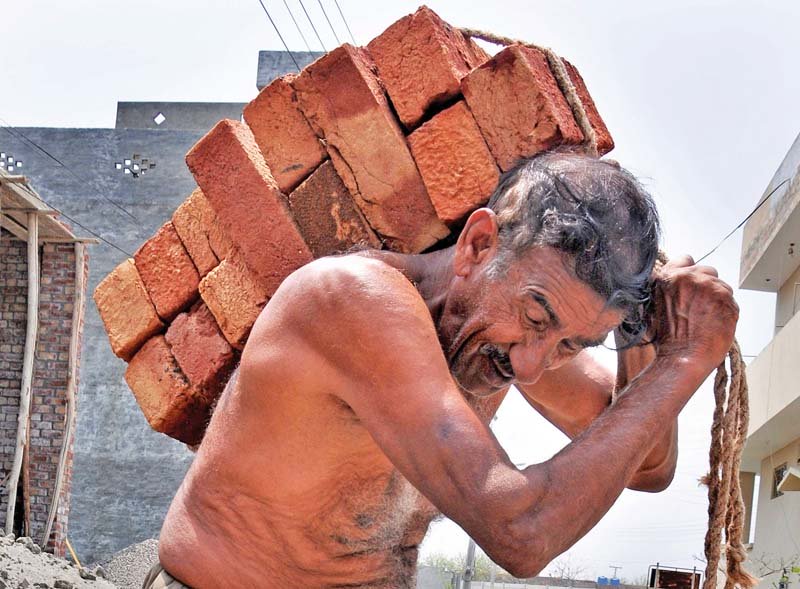
The conference was attended by 150 heads of state, environmental experts and activists from all over the globe, to discuss climate change, ways of reducing global emissions, adopting a climate compatible growth trajectory and implementing their national action plans to improve the environment.
While it was heartening to see the premier addressing global challenges and declaring Pakistan’s commitment to improve the domestic and global environment, it is unfortunate that the declared policy has not trickled down to our policymakers.
One glaring example in this regard, is the government’s failure to shut down brick kilns operating in Pakistan, especially in Punjab. These kilns constitute a major emitter of greenhouse gases that cause global warming and make communities vulnerable to climate crises.
Apart from being the major source of pollution, kilns remain a social menace as ‘bonded labour’ is also endemic within the brick industry.
Slavery
At a time when human rights are spreading far and wide, governments are legislating laws to eradicate bonded-labour and contemporary forms of slavery from their countries. Punjab in particular is a ‘hotspot’ of bonded labour in Pakistan, especially in sectors like brick making.
Brick kiln workers are from the poorest, most down-trodden segments of society and often trapped in a vicious cycle of ‘debt’ and ‘bondage.’ The workers are recruited against a ‘loan’ or advance payment by a labour contractor or kiln owner, which they have to repay in installments, by working on the kiln, over many years and sometimes over generations.
This loan is sanctioned to them to buy food and to meet basic needs in a poverty ridden community. But since the wages paid to the workers are so minimal, the loans cannot be paid back in the given frame of time. Hence, they have no choice but to work as slaves to service their debt and are often shackled in bonded in labour for life - a practice that is widespread in Pakistan, despite being outlawed under the Bonded Labor System (Abolition) Act of in 1992.
Pakistan is also obligated to eradicate this practice under Conventions No 29 and No 105 of the ILO. In the absence of written contracts of employment, it is difficult to monitor whether or not the minimum wage is being paid to workers, so thousands of people, including women and young children work without a salary, education, healthcare and financial support, in harsh conditions that are unacceptable under domestic and international standards.
The Global Slavery Index Report estimates that more than 1% of 185.13 million people in Pakistan are enslaved. This puts Pakistan among the top positions in the “Slavery’s List of Shame!”
In most cases, workers don’t even have access to rudimentary first aid.
Sometimes kiln workers are even blackmailed and implicated in bogus cases if they try to resist the oppression of their de-facto owners.
Kiln workers also suffer from heat strokes, hand burns, asthma and tuberculosis, hepatitis C, skin diseases including eczema, skin cancer and other infections of hand and feet.
Exposure to hazardous substances such as arsenic, burnt plastic, smoke, dust, coal soot and lack of proper ventilation also makes them vulnerable to eye problems like conjunctivitis, and stomach ailments because of dirty water.
The contradiction
In pursuance of Prime Minister Nawaz Sharif’s initiative to accelerate the pace of construction in the country, an exemption in Sales Tax to the Block and Brick industry was announced in the Federal budget 2015-16.
Adding insult to injury, the bureaucracy, in total breach of the evident spirit of the budget, has decided to further the cause of Bhattas and Kilns by seemingly disallowing sales tax exemption to Block and Bricks not produced in the criminal way.
The only other possible reason to take such an approach would be to discriminate against Sindh where the use of concrete block is already very prevalent unlike Punjab.
Sadly, the FBR’s decision is not only against the policy statement of the government at the international level but is also a major source of exploitation of small provinces like Sindh, since Sindh largely uses concrete blocks whereas Punjab uses bricks from the Bhattas
Either it is a deliberate decision to make the construction industry in Sindh sick and move all activity to Punjab or it is a lack of understanding of the repercussions? This discrimination will obviously affect builders and developers in Sindh, as they will end up paying more for construction inputs. One is also at loss to understand why Sindh has not taken up this issue in the Council of Common Interests.
Published in The Express Tribune, January 18th, 2016.
Like Business on Facebook, follow @TribuneBiz on Twitter to stay informed and join in the conversation.






1719053250-0/BeFunky-collage-(5)1719053250-0-270x192.webp)










COMMENTS (1)
Comments are moderated and generally will be posted if they are on-topic and not abusive.
For more information, please see our Comments FAQ